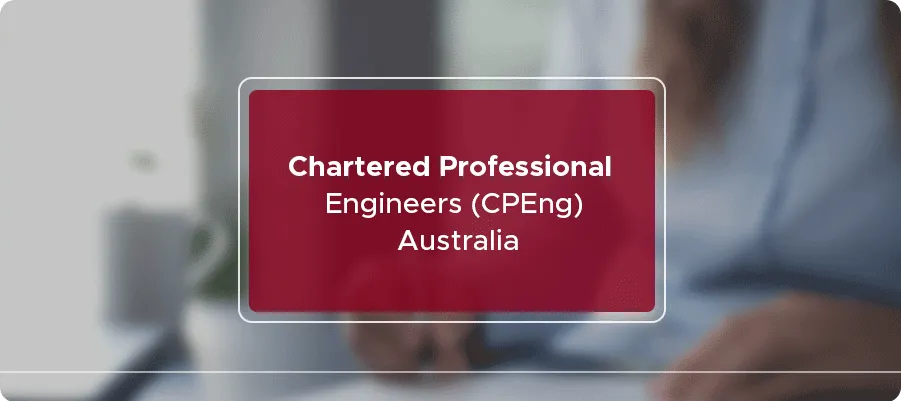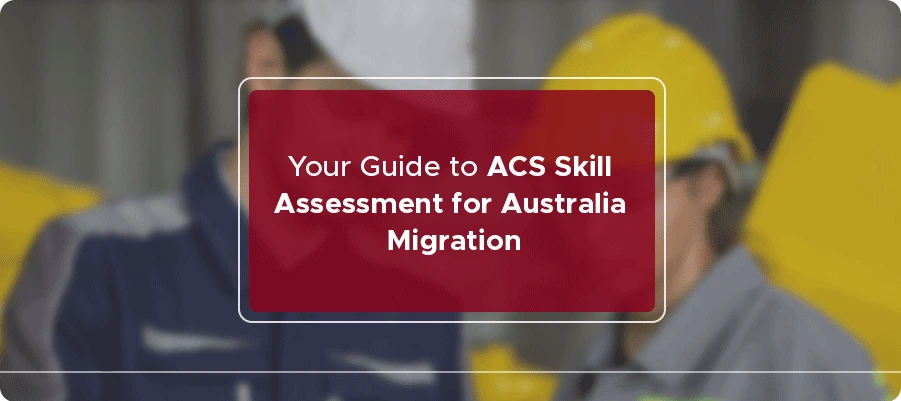
Your Guide to ACS Skill Assessment for Australia Migration
Skilled workers are being prized more and more towards Australia and it is said due to their enormous scope for job opportunities, especially reserved for IT professionals.
ACS approval can be held as one of the first and most important steps in the migration process. The ACS skill assessment evaluates the qualifications and experience of IT professionals seeking to migrate to Australia under the Government Skilled Migration Programme.
This guide shall take you through the stepwise assessment procedure and help you through every step of that assessment process. It contains details regarding eligibility, application process, requirements of documentation, assessment methodologies, and advice for success.
ACS Skill Assessment Guideline
The ACS Skill Assessment evaluates whether the skills of the candidate meet Australian standards for ICT occupations based on their education and work experience.
Without the assessment, it becomes impossible for any IT specialists to migrate to Australia under their plans of visa subclass like the Skilled Independent Visa (Subclass 189), Skilled Nominated Visa (Subclass 190), and the Skilled Work Regional (Provisional) Visa (Subclass 491).
Learn more: Document checklist for ACS Skill Assessment ✔️📃
Who needs an ACS skill assessment?
In this assessment, ICT professionals wishing to apply for Australian migration under the continuing General Skilled Migration (GSM) programme get their skill assessment from the ACS.
Some jobs covered under this include:
- Software Engineer
- Systems Analyst
- Network Administrator
- Web Developer
- ICT Security Specialist
- Database Administrator
- ICT Business Analyst
- IT Support Engineer
No matter having a degree in IT, an ACS assessment must be obtained to validate your skills and experience.
What are the ACS skill assessment pathways?
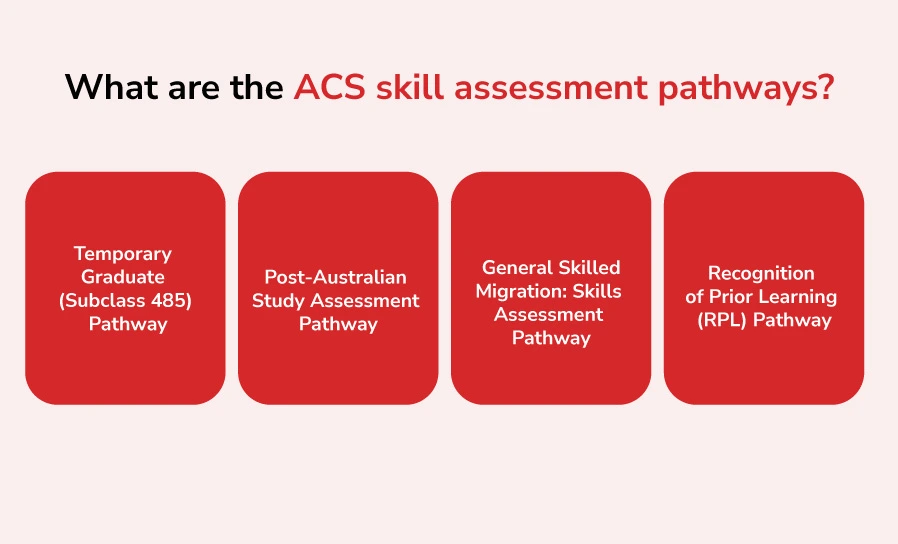
The skill assessment provided by the ACS outlines several pathways to be pursued by ICT professionals for qualification and work experience.
The selection of the appropriate pathway will depend on the academic and professional background. The following are the main ACS skill assessment pathways:
1. Temporary Graduate (Subclass 485) Pathway
Who is eligible?
Recent Australian graduates who require a Temporary Graduate Visa (Subclass 485).
Requirements:
The degree must be ICT-related from an Australian institute within the last two years.
No work experience is required.
2. Post-Australian Study Assessment Pathway
Who is it for?
International students studying ICT courses in Australia who pursue permanent residency or skilled immigration.
Requirements:
A Bachelor’s degree majoring in ICT from an Australian institution
Along with a year of relevant work experience OR completion of an ACS Professional Year Programme (PYP).
3. General Skilled Migration: Skills Assessment Pathway
This pathway is for professionals with overseas qualifications or Australian qualifications without PYP completion. It has two streams:
ICT Major with Relevant Work Experience
Requirements:
- A degree with a major in ICT directly related to your nominated occupation
- Experience of 2-4 years is relevant depending upon the degree level.
- ICT sub-major with Relevant Work Experience
Requirements:
- A degree with a sub-major in ICT contents less than 65%.
- A minimum of 5-6 years of work experience directly related to the nominated occupation.
4. Recognition of Prior Learning (RPL) Pathway
Requirements:
- A minimum of 6 years of relevant work experience in ICT.
- If there exists a gap between your experiences in the nominated occupation, 8 years must be maintained.
- Submission of the RPL report explaining the general knowledge of ICT development, ICT projects, and work undertaken would cater to the submission.
Learn more: Statutory Declarations and Affidavits in ACS Skill Assessment 👈💭
Application Process for ACS
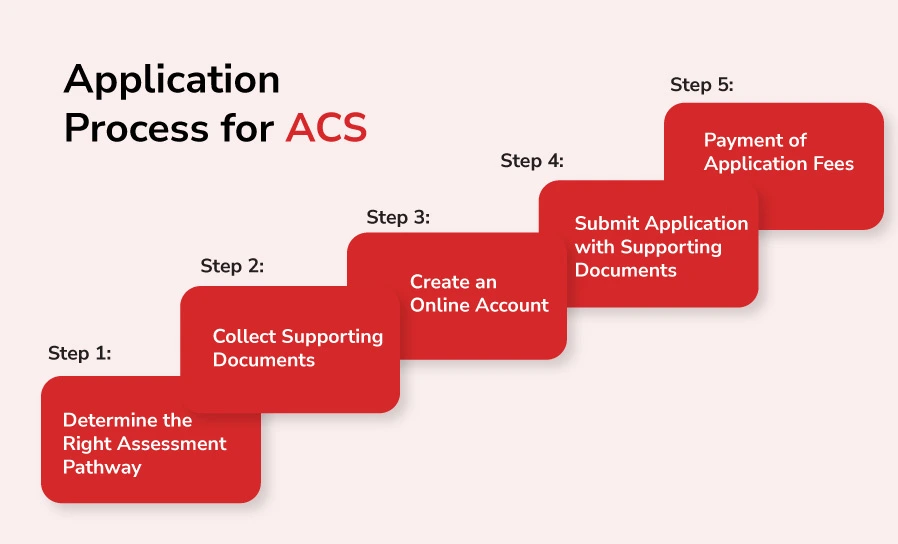
The Migration Skills Assessment stands as the first obstacle towards registration of the ICT professional’s application documents, which will allow him/her to migrate to Australia.
It has combined the qualifications with work experience to judge and ascertain eligibility for a skill migration programme. You now have to read through and understand how to apply for the assessment process:
Step 1: Determine the Right Assessment Pathway
The ACS skill assessment will assign different assessment pathways based on the qualifications and experience as follows:
a. Temporary Graduate
For someone who has recently graduated from an Australian university with an ICT qualification.
b. Post-Australian Study
An ICT degree that has been completed in Australia and with at least one year of work experience relevant to the degree.
c. Skills Assessment
This appears to be the most common pathway that could be opened for an applicant with his/her international qualifications and experience.
d. Recognition of Prior Learning (RPL)
For someone who does not hold an ICT qualification but has been working in the field for a considerable period.
Step 2: Collect Supporting Documents
Documents vary, but some of those that need to be submitted include:
a. Educational qualifications
Degrees, diplomas, or certificates.
b. Employment reference letters
Business letters from past employers stating what your roles in the company were, what you had to carry out in connection with your responsibilities, and how long you’ve been working.
c. Curriculum vitae/resume
A detailed account of your education and work history.
d. Identity documents
Passport, birth certificate, etc. or other forms of identification.
Step 3: Create an Online Account
Visit the ACS website and set up an online account on the application portal. You will have to provide personal information and information upon qualifications and working experience.
Step 4: Submit Application with Supporting Documents
Submit your application via the online portal, uploading all required documents as clearly and legibly as required by ACS.
Step 5: Payment of Application Fees
Pay the assessment fee through the online portal.
What are the documents required for the ACS Skill Assessment?
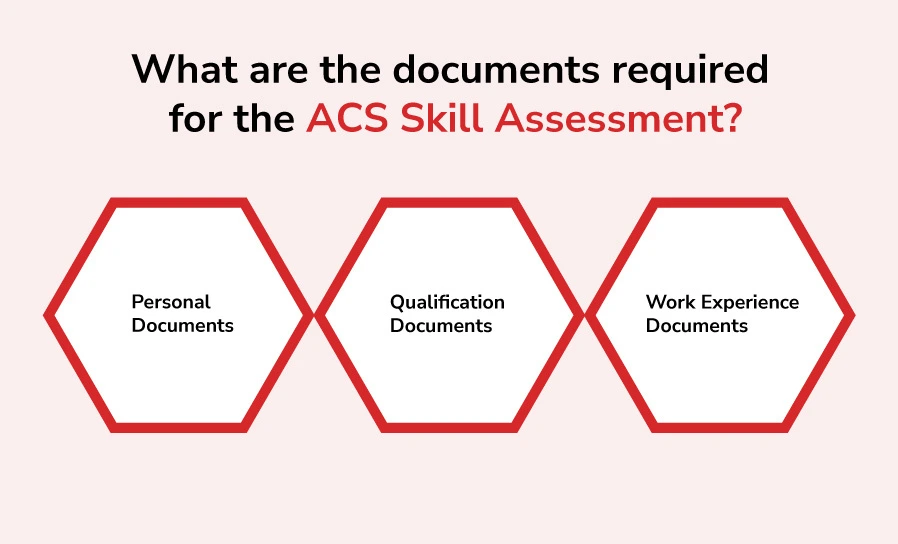
The Australian Computer Society Migration Skills Assessment requires various documentation to support the assessment of your qualifications and relevant working experience.
Given below are broad categories of the documents needed:
1. Personal Documents
a. Passport or birth certificate
Colour photocopies of the identification page of your passport or your entire birth certificate. Be sure that your name corresponds with that you used in your application.
b. Proof of the name change
If applicable, a colour photocopy of the legal document establishing your name change (for instance, a marriage certificate or deed poll).
c. Resume or CV
Your latest, well-structured resume or curriculum vitae whose main focus is education, work experience, clubs, and any other relevant aspects of your side and achievements.
2. Qualification Documents
Academic qualifications
a. Degree/Award certificates
Colour photocopies of the degree certificates that stipulate the title of the degree, awarding institution, and completion date.
b. Academic transcripts
colour photocopies of the academic transcripts indicating all subjects/units and grades/marks obtained (if available) with the mention of the grading system used by the awarding institute.
c. Vendor Qualifications
Documents in case you hold any accrediting IT vendor certification (for instance, Microsoft, Cisco).
3. Work Experience Documents
For every employment you claim, you have to provide two facets of evidence:
a. Employment References
Letters from your past employers must be on company letterhead, signed and dated by an authorised person.
The letters must contain:
- Employer’s name, address and logo
- Your name
- Dates of employment
- Your job title/position
- Description of duties and responsibilities
- Salary and benefits
- Work location
- Contact information of the signatory
Payslips, displaying your name and the name of the employer.
ACS Skill Assessment Processing Time
1. Standard Processing Time
Generally, the ACS skill assessment reviews standard applications within eight to ten weeks. It may take this long after your application with fees paid and all accompanying documents have been lodged.
The period may differ depending on the number of applications or extra information required.
2. Priority Processing
In urgent cases, this might be treated as priority processing. This streamlines the assessment process.
Nevertheless, acceptance is at the discretion of ACS, and you’ll need to justify the urgency with authentic reasons. If the application is approved, processing can occur in much less time.
ACS Skills Assessment Fees
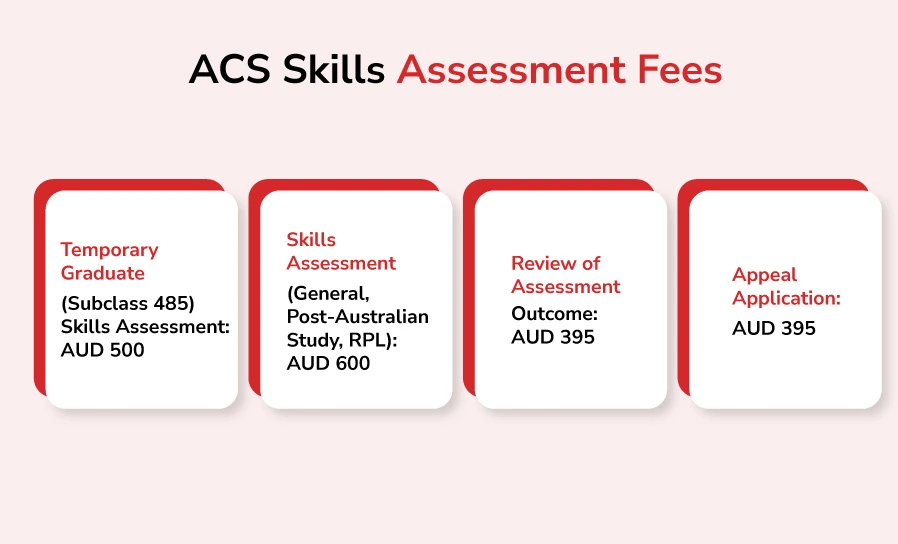
The ACS charges different fees According to the various assessments you apply for. The breakdown is given below:
1. Temporary Graduate (Subclass 485) Skills Assessment: AUD 500
For applicants for temporary graduate visas (Subclass 485) who have finished their coursework within the last two years.
This assessment is done to see if your ICT qualifications are recognised as well as equivalently valued in Australia.
2. Skills Assessment (General, Post-Australian Study, RPL): AUD 600
- General Skills Assessment
For applicants with ICT qualifications and work experience seeking migration.
- Post-Australian Study
International students who obtained their ICT qualification in Australia.
- RPL (Recognition of Prior Learning)
For people without formal ICT qualifications but significant experience in ICT. This involves the submission of detailed project reports to establish relevant skills.
3. Review of Assessment Outcome: AUD 395
If you feel the outcome of your assessment is incorrect and you want a review of such decisions,
It is the same assessment procedure without the provision of any further information.
4. Appeal Application: AUD 395
In this case, if you are unsatisfied with the outcome of the review, you can set an appeal.
Appeals differ from reviews, as they allow for new evidence or additional documents to be presented.
The decisions made on appeals are then submitted to a separate panel for review in private.
Know more: ACS RPL skills assessment pathways for skilled migration 🌏✈️
Conclusion
The ACS Skills Assessment is one of the most important events in your Australian migration process, especially for those in the IT profession. Knowledge of the assessment criteria, proper pathway selection, and avoidance of common reasons for rejection mainly improve your chances of success.
The preparation is tiresome and takes considerable time, but you can be successful with the required preparation. If in doubt, seek the advice of an expert who will see you through it and ensure your application is as strong as it can be.
FAQs
1. How do I check my ACS skill assessment status?
You can check the ACS skill assessment status in the ACS online portal from where you submit your application.
2. What documents are required for the ACS RPL Skills assessment?
The documents that are required for the ACS RPL Skill Assessment are as follows:
- Passport
- CV with ICT roles
- Employment Proof
- RPL Report
- Certificates
- Name Change Proof
3. How long is the assessment valid for the ACS Skills Assessment?
The ACS Skills Assessment is typically valid for three years from the date of issue.
4. What is the processing time for the ACS Skills Assessment?
The processing time for the ACS Skills Assessment generally takes around 4 to 6 weeks.
5. What is the assessment process for ACS Assessment?
- Check Eligibility
- Prepare Documents
- Submit Application
- Assessment
- Outcome
6. What are the benefits of RPL?
The benefits of RPL are as follows:
- Skill Recognition
- Migration Pathway
- Faster Process
- Cost-Effective
- Career Opportunities
- Professional Development


